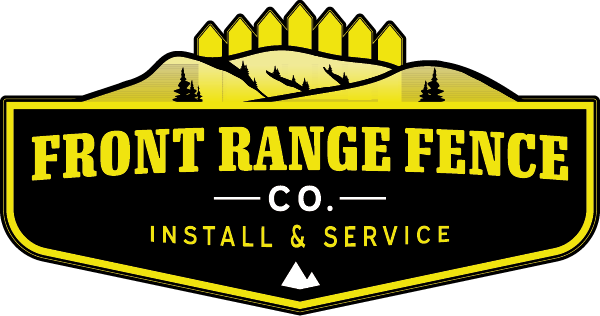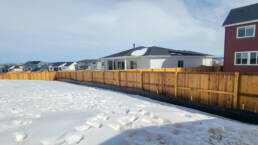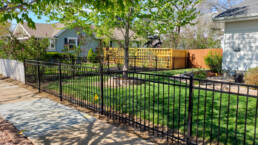There is no denying that the winter weather in Colorado gets pretty harsh. The term harsh refers to harsh weather conditions that include rain, cold wind, sleet, ice, snow, or a combination thereof. It doesn’t help that these conditions can start in October and continue well into spring. Are you and your fence prepared for winter?
After investing good money to protect your home with a good fence/gate combination, it would seem prudent to do what you can to protect your investment. Protecting your fence/gate investment refers to taking the necessary steps to prevent harsh weather conditions from harming your property.
Of course, it’s not likely you can avoid all weather-related wear and tear to your fencing, but there are steps you can take to minimize the possible wear and tear. With that in mind, let’s take a look at six (6) steps you can take now to protect your fencing this winter and the next.
Note: The steps you will need to take can vary based on the type of fencing and gate(s) you have. It’s wooden and vinyl fences that are most susceptible to harsh weather conditions
1. Trim Overhanging Trees
If by chance you have trees located close to your fence line, there is a potential danger when snow and ice start falling, particularly ice. As snow and ice accumulate on branches, it creates a situation where the weight could become more than a branch or even a tree can bear. That opens the door to the possibility of branches and trees falling on your fence, causing damage in the process.
The best way to address this potential problem is to trim trees prior to the arrival of winter. When trimming your trees, you will want to focus on larger branches that could fall and do damage. Any branches that could breach your fence or gate should be trimmed back far enough for the proper clearance. Also, be wary of trees that may not be as stable as you would want them to be. If you need to cut down trees to protect your fence, that’s something you should consider doing.
2. Keep Water/Snow Away From Your Fencing
If you have a wooden fence, you need to recognize that water is the enemy. The more water your wooden fence gets exposed to, the more likely it is that your fence will be exposed to possible warping and rotting.
For starters, you should go out and clear ice and snow off the fence after each snowstorm. The longer the snow and or ice stays on the fence, the more water the fence will be forced to absorb. You should do this at the same time you might go out and clear your sidewalks and driveway. If you don’t have the time to do it after each storm, it’s likely there is a kid somewhere in your neighborhood that would be happy to do it for a few bucks.
You also need to be wary of the accumulation of ice and snow for another reason. As the weight of the snow and or ice builds on your fence, it opens the door to damage. The damage may come in the form of broken rails or even the fence bending or falling towards the ground.
3. Protect Vinyl Fencing
Vinyl fencing is particularly susceptible to wind and ice damage. The danger lies in the fact that snow and ice will adhere to a vinyl surface. With any kind of accumulation, there would be a risk that the vinyl would warp or tear. Either of these issues could result in you having to replace a whole section of your vinyl fencing when the weather improves.
The cleanup process also warrants caution. When you go out to clear snow and ice away from vinyl, you have to be careful. A snowblower or any shoveling done near a vinyl surface exposes that surface to potential tears. Prior to the arrival of winter, it would be a good idea to clear shrubs and weeds away from the fence line. That makes it easier to access your fence for cleanup. With a clear pathway, you can go out as needed and do your cleanup. This really applies to all kinds of fences.
One last tip related to vinyl fencing. There are steps you can take to protect your vinyl fence from wind. If a tear does occur because of weather conditions, you should get the tear mended as quickly as possible. That could help prevent a minor tear from turning into a major rear that requires fence replacement.
4. Prevent Shifting Soil
You can never forget that your fence posts are grounded in the earth. As the earth absorbs more moisture, it destabilizes the soil, going deeper and deeper as the moisture accumulates.
Given the danger associated with pooled water accumulating at the base of fence posts, there are a couple of steps you can take to combat this issue. First, your might want to create effective drainage channels that lead away from your fence line. The more water you can move from the fence, the less water there will be to affect the soil around the fence posts.
Another thing you can do is properly maintain your lawn for winter. You can do that by making sure you are staying on top of removing fallen debris around your fence. This fallen debris absorbs water, which puts extra weight on the soil around your fence posts.
Finally, you need to do an intermittent inspection to ensure your fence posts are staying straight. If you look at them from afar, you should be able to detect any unwanted leaning one way or another. If your fencing company installed your fence posts at least three feet under the ground, it’s less likely you will encounter this kind of problem.
5. Use Wood Preservation Methods
In the case of a wood fence, there are some precautions you can take to protect the integrity of the wood. The most important step would be the application of some kind of weatherproofing or wood preservatives. You can do that with some paints and stains, but you should also take note of possible sun damage while you are at it. That would require that you use some kind of product that includes some level of UV protection.
6. Do Periodic Fence/Gate Inspections
Every time there is a break in the weather, you should consider that to be an opportunity to go out and properly inspect your fence. This is a precaution you can take that will save you a lot of money in the long run. How? It will help you identify small issues before they become major issues. It costs a lot less money to fix a minor issue.
What you should be checking for would be shifting posts, water accumulation around the posts, and any damage that might have happened to rails and planks due to falling debris. Again, it’s always prudent to fight the little battles in order to avoid the big battles.
Thinking of Installing a New Fence/Gate Combination?
After a harsh Colorado winter, you need to have the integrity of your fence and gate(s) inspected. You can do that by contacting a professional fence company like Front Range Fence Company.
After a full inspection, you can immediately address any minor issues that crept up in the wintertime. It’s important that you have repairs done while the weather is good. If by chance there is a lot of damage or issues arising, you might be in the market for a new fence/gate combination.
If you decide to go with new fencing, you definitely need to consult with us at Front Range Fence Company. We can help you select the proper fencing based on your needs. For certain, we would make our recommendations only after taking into account future weather conditions and your ability and willingness to maintain your fence. We’ll help you select a fence that’s appropriate for you and your property.
We hope you can survive another Colorado winter with your fencing intact. Hopefully, the aforementioned suggestions will help you do just that. Think of it this way: your fence, like your home, is an investment that is worthy of your protection.
For more information about how you can maintain your fence/gate to endure another harsh Colorado winter, contact us.

Contact us today to discuss your fencing needs and schedule an onsite estimate.
Let us help you create a secure, beautiful, and enduring fencing solution that complements your property and exceeds your expectations. Experience the difference of our top-notch fencing services and join our list of satisfied customers.
Like this article? Spread the word!
Related Posts
November 15, 2024
Quality Residential, Commercial, and Agricultural Gates and Fences in Denver Metro Area
Front Range Fence offers quality residential, commercial, and agricultural gates and fences in Castle Rock and the…
0 Comments15 Minutes
October 25, 2024
High-Quality Fencing in Denver with Front Range Fence: Meeting Every Need in Residential, Commercial, and Agricultural Fencing
Front Range Fence offers top-quality residential, commercial, and agricultural fencing solutions in the Denver Metro…
0 Comments17 Minutes
May 20, 2024
From Classic to Contemporary: Exploring Trendy Designs for Custom Residential Fences
Explore trendy residential fence designs in Denver, from classic to contemporary. Learn how Front Range Fence can…
0 Comments14 Minutes




